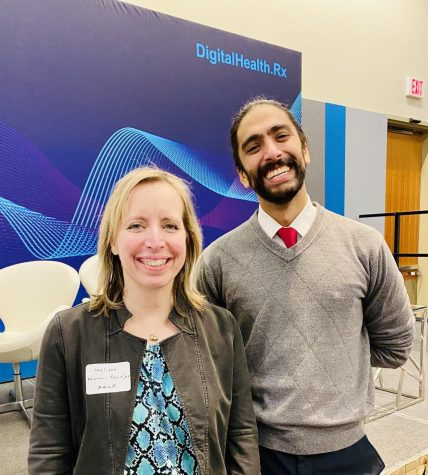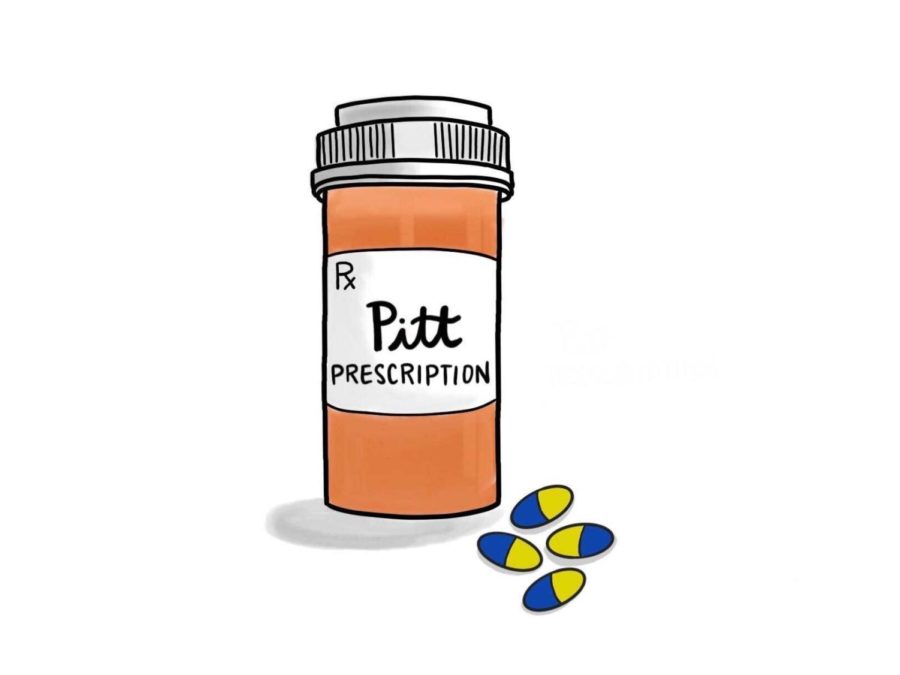The Pitt Prescription | Digital health: the exciting future of healthcare
The Pitt Prescription is a biweekly blog where student pharmacist and senior staff writer Elizabeth Donnelly provides tips on how to stay healthy in college. This edition was reviewed by Karen Pater, PharmD, CDCES, BCACP.
Shruti Talekar | Contributing Editor
The Pitt Prescription
April 21, 2022
With the onset of the COVID-19 pandemic in March 2020, many institutions saw a rapid switch to virtual learning, Pitt included.
Because of this, a new era of online and remote work emerged over the past two years. Medical professionals were quick to follow this switch, with telehealth visits increasing in popularity due to convenience and out of necessity. As of July 2021, telehealth use has stabilized to around 38 times the level it was pre-pandemic.
Telehealth is just one facet of a much larger up-and-coming phenomenon — digital health. Digital health is a broad range of personalized health technologies including things like wearable devices, telehealth, personalized medicine and mobile health, among others. This field of healthcare involves information and communication technology within medicine to help manage patient conditions, potential health risks and to promote general wellness and preventative care.
Digital health covers an extensive scope of practice and it has revolutionized the healthcare field because it works to improve patient access to care, reduce health disparities and inequalities in the healthcare system and improve the quality of patient care. Additionally, digital health aims to lower the costs associated with healthcare while providing more personalized care to each individual patient based on their certain life circumstances.
Devices like wearable blood sugar trackers, medical technology that connects to smartphones and other cutting-edge tools to help people monitor conditions like high blood pressure or diabetes are all the result of the innovations within the field of digital health. There are numerous apps that can help people stay on top of their own wellbeing, like Clue, an app for tracking menstruation and related symptoms, or Talkspace, an app focused on mental health. These kinds of online apps have a huge impact on accessibility and the scope of care within the United States. Patients who may not have access to medical centers or who have busy schedules now have the option to use innovative technologies to help assist them between appointments.
These tools also help people to remain compliant with their medication regimens and are able to provide reminders and track different activities, such as blood sugar readings or the amount of physical activity someone is getting each day. Digital health technologies are not only useful to patients — providers also benefit from the assortment of tools this field provides.
From artificial intelligence to medical software containing endless clinical information, there are several tools that clinicians and other healthcare providers can utilize to enhance patient care. The FDA recognizes digital health as a growing entity and reports that it has the potential to improve providers’ abilities to “accurately diagnose and treat disease and to enhance the delivery of health care for” individuals.
In the world of pharmacy, Pitt is a frontrunner in digital health, and several Pitt Pharmacy members are working to pave the way to set pharmacists up for success in this rapidly evolving field. Dr. Ravi Patel is Pitt’s Lead Innovation Advisor at the School of Pharmacy, and he has worked closely with several students as well as visiting professionals to enhance digital health here at Pitt.
Recently, Dr. Patel presented at the American Pharmacists Association (APhA) Annual Meeting alongside Melissa Murer Corrigan, the Executive Director for the American Association of Colleges of Pharmacy Transformation Center. Their talk focused on innovation and new technologies during APhA’s DigtialHealth.Rx Summit. This is just one example of how Pitt Pharmacy is performing national outreach to promote digital health.

Another example is the student hackathon, which was hosted virtually last month from March 11-13. This hackathon was another collaboration with APhA that several Pitt Pharmacy students participated in. These students partnered with Dr. Parisa Vatanka, an expert in digital health, to organize and lead the hackathon.
“The hackathon was developed for students by students,” Vatanka said. “It aimed to give students around the world a chance to collaborate on tech solutions to healthcare problems. Students from different majors were invited to come together to address healthcare’s grand challenges — improving access to healthcare, reducing inefficiencies in healthcare, and fostering well-being and resiliency.”
The hackathon was a huge success, garnering students from 12 different countries, 16 U.S. states and 15 diverse majors. Several teams came together to create innovative projects that were then judged and given awards. Third-year Pitt student pharmacist Matt Grubic was one of the students who helped develop this event.
“Witnessing each team collaborate and grind tirelessly over a 48-hour period was nothing short of inspirational, especially after considering the quality of each project delivered,” Grubic said. “We look forward to expanding the access of hackathons to student pharmacists and encouraging inter-professional collaboration with health technology students to make lasting impacts in the evolving field of digital health.”
As digital health and other innovative technologies pick up, Pitt Pharmacy will work to keep up and continue working as dedicated leaders. Digital health is an ever-expanding field, and we are just starting to see what it is capable of when utilized correctly. All practitioners have differing roles, but pharmacists especially are key players.
When digital health practices start to be the new norm, pharmacists around the country will have to integrate care into these technological models. Pharmacists may assist with monitoring digital devices and accessing data to utilize for the optimization of patient care. As technology progresses, so will the role of pharmacists and other healthcare providers. This will hopefully result in the resolution of issues like lack of access to quality care and the presence of health disparities in marginalized communities.
Elizabeth writes primarily about self-care and pharmacological topics. For questions, comments or concerns, you can reach her at [email protected].








